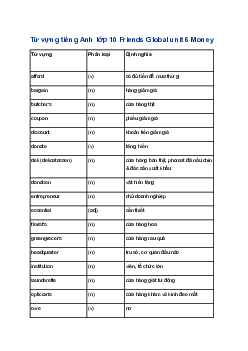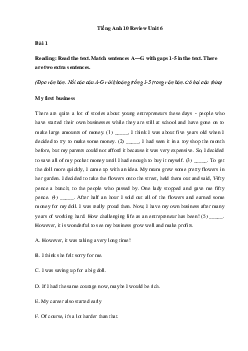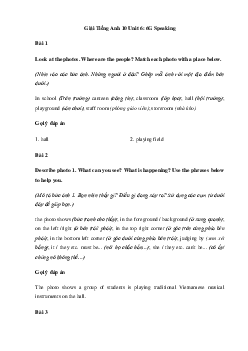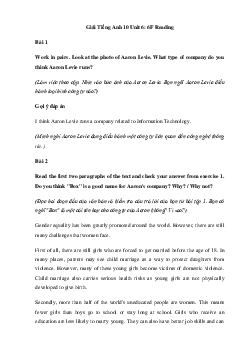




Preview text:
Giải Tiếng Anh 10 Unit 6: 6E Grammar Bài 1
1. Work in pairs. Describe the photo. What do you think the woman is doing?
(Làm việc theo cặp. Mô tả bức ảnh. Bạn nghĩ người phụ nữ đang làm gì?) Gợi ý đáp án
She is checking a price on the internet. Bài 2
Read the text. Then answer the questions.
(Đọc văn bản. Sau đó trả lời các câu hỏi.)
1. What is 'showrooming? Have you or someone you know ever showroomed?
2. Do you prefer to buy things in shops or online? Why?
3. Should you expect to pay more for goods in a shop than on a website? Why? /Why not?
4. What would you do if you had to pay to look around a shop? That'll be $5, please.
A health food shop in Adelaide, Australia, has decided to charge customers S5 for "just
looking". The problem is that customers keep coming into the shop and leaving without
buying anything. “They pretend to be interested in a product and ask for advice,” says Kate
Reeves, the shop owner, "but they usually don't buy anything."
This new phenomenon is called "showrooming". People visit a shop, examine a product, and
then buy it online, where it is cheaper. Kate says she spends hours every day talking about
products with customers "I can't stand working and not getting paid," she says. 'No one can make me work for free!'
Everyone avoids paying more than they have to, but customers fail to realise that Kate's prices
are mostly the same as in larger stores and on websites. They prefer to shop elsewhere as they
expect to find the product at a lower price. "If customers choose to buy something, I return the $5 fee," says Kate.
Many shops face the same problem and some may end up introducing a similar charge. The
danger is that it asks putting customers off. But Kate in Adelaide says it has made no difference to her business. Gợi ý đáp án
1. ‘Showrooming’ is when people visit a shop, examine a product, and then buy it online.
Sometimes I showroomed because I just want to take a look at the products but don't want to buy.
(Hành vi xem mẫu sản phẩm là khi mọi người ghé cửa hàng, nghiên cứu một sản phẩm, rồi
mua nó trên mạng. Đôi khi tôi làm vậy vì tôi chỉ muốn nhìn qua sản phẩm nhưng không muốn mua.)
2. I prefer buy things online because it saves time and money.
(Tôi thích mua hàng trên mạng vì nó tiết kiệm thời gian và tiền bạc.) 3. No I don't. (Không)
4. I would just look and not touch anything. (Tôi sẽ chỉ nhìn và không đụng bất cứ thứ gì.) Bài 3
Read the Learn this! box. Then find all the verbs in the text in exercise 2 that are
followed by the infinitive, bare form or -ing form of another verb. Make three lists in your notebook.
(Đọc phần Learn this! Sau đó, tìm tất cả các động từ trong bài khóa ở bài tập 2 được theo sau
bởi dạng nguyên mẫu có to, nguyên mẫu không to hoặc dạng -ing của một động từ khác. Lập
ba danh sách trong sổ tay của bạn.)
Learn this! Verb patterns (Dạng của động từ)
a. Some verbs are followed by the infinite of another verb. Do you want to go out? She hopes to be a teacher.
b. Some verbs are followed by the -ing form of another verb. I fancy going out. He keeps on interrupting.
b. Some verbs are followed by bare form of another verb. Clowns make kids laugh.
Let me order a pizza. (Để tôi đặt một cái pizza.) Gợi ý đáp án
Infinitive: decide, pretend, refuse, fail, prefer, expect, choose
-ing form: keep, spend (time), can’t stand, avoid, end up, risk bare form: make Bài 4
Read the Dictionary Skills Strategy and study the dictionary entries below. Which verb
a) takes an infinitive, b) takes an -ing form, and c) takes a bare form?
(Đọc Chiến lược Kỹ năng sử dụng từ điển và nghiên cứu các mục từ điển bên dưới. Động từ
nào a) ở dạng nguyên mẫu có to, b) ở dạng Ving, và c) nguyên mẫu không to?)
Dictionary Strategy Skills Strategy
(Chiến thuật kỹ năng tra từ điển)
Entries for verbs in learner’s dictionaries will show you patterns the verb is used in. They may
show the pattern like this at the start of the entry: suggest (doing), want (to do), let … (do) or
give an example within the entry: She suggested eating out.
(Các mục cho động từ trong từ điểm của người học sẽ cho bạn thấy dạng của động từ được sử
dụng như thế nào. Họ sẽ cho biết dạng như thế này trong đầu mục: : suggest (doing), want (to
do), let … (do) hoặc đưa ra ví dụ trong mục: Cô ấy gợi ý đi ăn ngoài.) Gợi ý đáp án a. refuse b. avoid c. let Bài 5
Look up these words in a dictionary and add them to the lists you made in exercise 3.
(Tra những từ này trong từ điển và thêm chúng vào danh sách bạn đã thực hiện trong bài tập 3)
admit (thú nhận); agree (đồng ý); help (giúp đỡ); mind (phiền); offer (cho); promise (hứa) Gợi ý đáp án
Infinitive: agree, offer, promise, help -ing form: admit, mind bare form: help Bài 6
Complete the sentences. Use the infinitive, bare form or -ing form of the verbs in brackets.
(Hoàn thành các câu. Sử dụng dạng nguyên mẫu có to, không to hoặc dạng Ving của các
động từ trong ngoặc.)
1. Jason promised _____ (phone) me.
2. Joe enjoys _____ (shop) in town but refuses _____ (shop) online.
3. Mysister lets me _____ (use) her laptop.
4. Mum offered _____ (give) me a lift to the shops.
5. You can expect _____ (pay) less online than in a shop.
6. Do you fancy _____ (go) to the cinema this evening?
7. Parents do not let children _____ (stay) up late.
8. My mum usually makes me _____ (tidy) up my room. Gợi ý đáp án 1. to phone 2. shopping; to shop 3. use 4. to give 5. to pay 6. going 7. stay 8. tidy Bài 7
(Làm việc theo cặp. Cung cấp thông tin trung thực về bản thân.) 1. I usually advoid ... 2. I really can't stand ... 3. I don't let ... 4. I spend a lot of time ... 5. I sometimes pretend ... 6. I really want ... Gợi ý đáp án
1. I usually avoid being angry.
2. I really can’t stand waiting in the queue.
3. I don’t let myself cry anymore.



